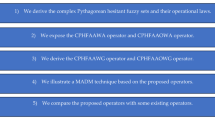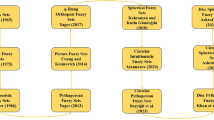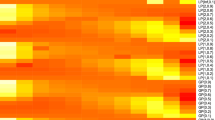Abstract
In a number of fuzzy systems, knowledge measures have been extensively investigated. However, no research on knowledge measures derived from divergence for standard fuzzy sets has been done. This study develops and validates a new generalized divergence measure for fuzzy sets based on the mathematical structure of Csiszár’s divergence. Some of its specific cases, mathematical properties, and performance comparisons are discussed. In addition, exploiting Csiszár’s divergence idea, a class of fuzzy knowledge measures has been established. The proposed fuzzy generalized divergence is then used to derive a new fuzzy generalized knowledge measure. Its efficacy in capturing the amount of useful information in fuzzy sets was demonstrated by comparing it to some strategic information measures. In uncertain multi-criteria decision-making (MCDM) situations, fuzzy entropy is typically adopted to compute the objective weights of criteria. However, it frequently provides unsatisfactory results. New optimization models for generating the objective weights based on the two proposed measures are implemented. These models incorporate both the principles of maximizing deviation and knowledge measures. This research also presents a novel approach based on a single ideal point for integrating Gray Relational Analysis (GRA) with VIKOR (Vlsekriterijumska Optimizacija I KOmpromisno Resenje). The developed technique focuses on discovering the most advantageous alternative, whose performance meets almost every benefit criterion, as well as identifying the criteria that make an alternative less effective. The consistency and rationality of the proposed approach are demonstrated through a numerical illustration along with sensitivity and comparative analysis.


Similar content being viewed by others
Change history
14 August 2023
A Correction to this paper has been published: https://doi.org/10.1007/s41066-023-00409-7
References
Arya V, Kumar S (2020) Knowledge measure and entropy: a complementary concept in fuzzy theory. Granul Comput 6(6):631–643. https://doi.org/10.1007/s41066-020-00221-7
Bajaj RK, Hooda D (2010) On some new generalized measures of fuzzy information. World Acad Sci Eng Technol 62:747–753
Bellman RE, Zadeh LA (1970) Decision-making in a fuzzy environment. Manage Sci 17(4):B141. https://doi.org/10.1287/mnsc.17.4.B141
Beran R (1977) Minimum hellinger distance estimates for parametric models. The annals of Statistics, pp 445–463. stable/2958896
Bhandari D, Pal NR (1993) Some new information measures for fuzzy sets. Inf Sci 67(3):209–228. https://doi.org/10.1016/0020-0255(93)90073-U
Bhatia P, Singh S (2012) Three families of generalized fuzzy directed divergence. AMO-Adv Model Optim 14(3):599–614
Brauers WK, Zavadskas EK (2006) The moora method and its application to privatization in a transition economy. Control Cybern 35:445–469
Chen CT (2000) Extensions of the topsis for group decision-making under fuzzy environment. Fuzzy Sets Syst 114(1):1–9. https://doi.org/10.1016/S0165-0114(97)00377-1
Chen SJ, Chen SM (2001) A new method to measure the similarity between fuzzy numbers. In: IEEE International Conference on Fuzzy Systems, IEEE, pp 1123–1126
Chen SJ, Hwang CL (1992) Fuzzy multiple attribute decision making methods. In: Fuzzy multiple attribute decision making. Springer, pp 289–486
Chen SM, Jian WS (2017) Fuzzy forecasting based on two-factors second-order fuzzy-trend logical relationship groups, similarity measures and pso techniques. Inf Sci 391:65–79. https://doi.org/10.1016/j.ins.2016.11.004
Chen WH, Tsai MS, Kuo HL (2005) Distribution system restoration using the hybrid fuzzy-grey method. IEEE Trans Power Syst 20(1):199–205. https://doi.org/10.1109/TPWRS.2004.841234
Chen SM, Zou XY, Barman D (2019) Adaptive weighted fuzzy rule interpolation based on ranking values and similarity measures of rough-fuzzy sets. Inf Sci 488:93–110. https://doi.org/10.1016/j.ins.2019.03.003
Cheng SH, Chen SM, Lan TC (2015) A new similarity measure between intuitionistic fuzzy sets for pattern recognition based on the centroid points of transformed fuzzy numbers. In: IEEE International Conference on Systems, Man, and Cybernetics, pp 2244–2249
Csiszár I (1967) Information-type measures of difference of probability distributions and indirect observation. studia scientiarum Mathematicarum Hungarica 2:229–318
Csiszár I, Korner J (1981) Graph decomposition: a new key to coding theorems. IEEE Trans Inf Theory 27(1):5–12. https://doi.org/10.1109/TIT.1981.1056281
Das S, Dutta B, Guha D (2016) Weight computation of criteria in a decision-making problem by knowledge measure with intuitionistic fuzzy set and interval-valued intuitionistic fuzzy set. Soft Comput 20(9):3421–3442. https://doi.org/10.1007/s00500-015-1813-3
De Luca A, Termini S (1972) A definition of a nonprobabilistic entropy in the setting of fuzzy sets theory. Inf Control 20(4):301–312. https://doi.org/10.1016/B978-1-4832-1450-4.50020-1
Dragomir SS (2003) Bounds for f-divergences under likelihood ratio constraints. Appl Math 48(3):205–223. https://doi.org/10.1023/A:1026054413327
Ebanks BR (1983) On measures of fuzziness and their representations. J Math Anal Appl 94(1):24–37. https://doi.org/10.1016/0022-247X(83)90003-3
Fan J, Xie W (1999) Distance measure and induced fuzzy entropy. Fuzzy Sets Syst 104(2):305–314. https://doi.org/10.1016/S0165-0114(99)80011-6
Garg H, Agarwal N, Tripathi A (2015) Entropy based multi-criteria decision making method under fuzzy environment and unknown attribute weights. Global J Technol Optimiz 6(3):13–20. https://doi.org/10.4172/2229-8711.1000182
Hwang CM, Yang MS (2008) On entropy of fuzzy sets. Int J Uncertain Fuzziness Knowl Based Syst 16(04):519–527. https://doi.org/10.1142/S021848850800539X
Hwang CL, Yoon K (1981) Methods for multiple attribute decision making. In: Multiple attribute decision making. Springer, pp 58–191
Jiang BC, Tasi SL, Wang CC (2002) Machine vision-based gray relational theory applied to ic marking inspection. IEEE Trans Semicond Manuf 15(4):531–539. https://doi.org/10.1109/TSM.2002.804906
Joshi R (2022) Multi-criteria decision making based on novel fuzzy knowledge measures. Granul Comput. https://doi.org/10.1007/s41066-022-00329-y
Joshi D, Kumar S (2014) Intuitionistic fuzzy entropy and distance measure based topsis method for multi-criteria decision making. Egypt Inf J 15(2):97–104. https://doi.org/10.1016/j.eij.2014.03.002
Joshi R, Kumar S (2018) An (r, s)-norm fuzzy information measure with its applications in multiple-attribute decision-making. Comput Appl Math 37(3):2943–2964. https://doi.org/10.1007/s40314-017-0491-4
Ju-Long D (1982) Control problems of grey systems. Syst Control Lett 1(5):288–294. https://doi.org/10.1016/S0167-6911(82)80025-X
Julong D (1989) Introduction to grey system theory. J Grey Syst 1(1):1–24
Kadian R, Kumar S (2022) A new picture fuzzy divergence measure based on jensen-tsallis information measure and its application to multicriteria decision making. Granul Comput 7(1):113–126. https://doi.org/10.1007/s41066-021-00254-6
Kullback S (1951) On information and sufficiency. Ann Math Stat 22:79–86. stable/2236703
Kuo MS, Liang GS (2011) Combining vikor with gra techniques to evaluate service quality of airports under fuzzy environment. Expert Syst Appl 38(3):1304–1312. https://doi.org/10.1016/j.eswa.2010.07.003
Lazarevic S (2001) Personnel selection fuzzy model. Int Trans Oper Res 8(1):89–105. https://doi.org/10.1111/1475-3995.00008
Mikhailov L (2000) A fuzzy programming method for deriving priorities in the analytic hierarchy process. J Oper Res Soc 51(3):341–349. https://doi.org/10.1057/palgrave.jors.2600899
Mishra AR, Rani P (2017) Information measures based topsis method for multicriteria decision making problem in intuitionistic fuzzy environment. Iran J Fuzzy Syst 14(6):41–63.https://doi.org/10.22111/IJFS.2017.3497
Mishra AR, Singh RK, Motwani D (2018) Intuitionistic fuzzy divergence measure-based electre method for performance of cellular mobile telephone service providers. Neural Comput Appl. https://doi.org/10.1007/s00521-018-3716-6
Montes S, Couso I, Gil P et al (2002) Divergence measure between fuzzy sets. Int J Approx Reason 30(2):91–105. https://doi.org/10.1016/S0888-613X(02)00063-4
Nguyen H (2015) A new knowledge-based measure for intuitionistic fuzzy sets and its application in multiple attribute group decision making. Expert Syst Appl 42(22):8766–8774. https://doi.org/10.1016/j.eswa.2015.07.030
Ohlan A (2015) A new generalized fuzzy divergence measure and applications. Fuzzy Inf Eng 7(4):507–523. https://doi.org/10.1016/j.fiae.2015.11.007
Ohlan A, Ohlan R (2016) Generalized hellinger’s fuzzy divergence measure and its applications. Generalizations of fuzzy information measures. Springer International Publishing, Cham, pp 107–121
Olson DL, Wu D (2006) Simulation of fuzzy multiattribute models for grey relationships. Eur J Oper Res 175(1):111–120. https://doi.org/10.1016/j.ejor.2005.05.002
Opricovic S, Tzeng GH (2004) Compromise solution by mcdm methods: a comparative analysis of vikor and topsis. Eur J Oper Res 156(2):445–455. https://doi.org/10.1016/S0377-2217(03)00020-1
Pal NR, Pal SK (1989) Object-background segmentation using new definitions of entropy. IEE Proc E-Comput Digit Tech 136(4):284–295
Pareto V, Bousquet G, Busino G (1964) Cours d’économie politique, vol 1. Librairie Droz, 8, rue Verdine
Rani P, Govindan K, Mishra AR et al (2020) Unified fuzzy divergence measures with multi-criteria decision making problems for sustainable planning of an e-waste recycling job selection. Symmetry 12(1):90. https://doi.org/10.3390/sym12010090
Renyi A, et al (1961) On measures of entropy and information. In: Proceedings of the fourth Berkeley symposium on mathematical statistics and probability, volume 1: contributions to the theory of statistics. The Regents of the University of California
Shahhosseini V, Sebt M (2011) Competency-based selection and assignment of human resources to construction projects. Scientia Iranica 18(2):163–180. https://doi.org/10.1016/j.scient.2011.03.026
Shannon CE (1948) A mathematical theory of communication. Bell Syst Tech J 27(3):379–423. https://doi.org/10.1002/j.1538-7305.1948.tb01338.x
Sharma DK, Singh S, Ganie AH (2022) Distance-based knowledge measure of hesitant fuzzy linguistic term set with its application in multi-criteria decision making. Int J Fuzzy Syst Appl (IJFSA) 11(1):1–20. https://doi.org/10.4018/IJFSA.292460
Singh S, Ganie AH (2021) Two-parametric generalized fuzzy knowledge measure and accuracy measure with applications. Int J Intell Syst 37(7):836–3880. https://doi.org/10.1002/int.22705
Singh S, Ganie AH (2022) Generalized hesitant fuzzy knowledge measure with its application to multi-criteria decision-making. Granul Comput 7(2):239–252. https://doi.org/10.1007/s41066-021-00263-5
Singh S, Lalotra S, Sharma S (2019) Dual concepts in fuzzy theory: entropy and knowledge measure. Int J Intell Syst 34(5):1034–1059. https://doi.org/10.1002/int.22085
Singh S, Sharma S, Ganie AH (2020) On generalized knowledge measure and generalized accuracy measure with applications to madm and pattern recognition. Comput Appl Math 39(3):1–44. https://doi.org/10.1007/s40314-020-01243-2
Szmidt E, Kacprzyk J (2000) Distances between intuitionistic fuzzy sets. Fuzzy Sets Syst 114(3):505–518. https://doi.org/10.1016/S0165-0114(98)00244-9
Szmidt E, Kacprzyk J, Bujnowski P (2011) Measuring the amount of knowledge for atanassov’s intuitionistic fuzzy sets. Paper presented in International Workshop on Fuzzy Logic and Applications, pp 17–24
Szmidt E, Kacprzyk J, Bujnowski P (2014) How to measure the amount of knowledge conveyed by atanassov’s intuitionistic fuzzy sets. Inf Sci 257:276–285. https://doi.org/10.1016/j.ins.2012.12.046
Taneja I (2013) Seven means, generalized triangular discrimination, and generating divergence measures. Information 4(2):198–239. https://doi.org/10.3390/info4020198
Tomar VP, Ohlan A (2014) New parametric generalized exponential fuzzy divergence measure. J Uncertain Anal Appl 2(1):24. https://doi.org/10.1186/s40467-014-0024-2
Tomar VP, Ohlan A (2014) Sequence of inequalities among fuzzy mean difference divergence measures and their applications. SpringerPlus 3(1):623. https://doi.org/10.1186/2193-1801-3-623
Triantaphyllou E, Lin CT (1996) Development and evaluation of five fuzzy multiattribute decision-making methods. Int J Approx Reason 14(4):281–310. https://doi.org/10.1016/0888-613X(95)00119-2
Tzeng GH, Lin CW, Opricovic S (2005) Multi-criteria analysis of alternative-fuel buses for public transportation. Energy Policy 33(11):1373–1383. https://doi.org/10.1016/j.enpol.2003.12.014
Umar A, Saraswat RN (2022) Decision-making in machine learning using novel picture fuzzy divergence measure. Neural Comput Appl 34(1):457–475. https://doi.org/10.1007/s00521-021-06353-4
Verma R, Maheshwari S (2017) A new measure of divergence with its application to multi-criteria decision making under fuzzy environment. Neural Comput Appl 28(8):2335–2350. https://doi.org/10.1007/s00521-016-2311-y
Wan SP, Wang F, Dong JY (2016) A novel risk attitudinal ranking method for intuitionistic fuzzy values and application to madm. Appl Soft Comput 40:98–112. https://doi.org/10.1016/j.asoc.2015.11.022
Wan SP, Jin Z, Dong JY (2020) A new order relation for pythagorean fuzzy numbers and application to multi-attribute group decision making. Knowl Inf Syst 62(2):751–785. https://doi.org/10.1007/s10115-019-01369-8
Wang T, Chang T (2005) Fuzzy vikor as a resolution for multicriteria group decision-making. The 11th international conference on industrial engineering and engineering management. Atlantis Press Paris, France, pp 352–356
Wang TC, Lee HD (2009) Developing a fuzzy topsis approach based on subjective weights and objective weights. Expert Syst Appl 36(5):8980–8985. https://doi.org/10.1016/j.eswa.2008.11.035
Wei GW (2008) Maximizing deviation method for multiple attribute decision making in intuitionistic fuzzy setting. Knowl Based Syst 21(8):833–836. https://doi.org/10.1016/j.knosys.2008.03.038
Wu X, Song Y, Wang Y (2021) Distance-based knowledge measure for intuitionistic fuzzy sets with its application in decision making. Entropy. https://doi.org/10.3390/e23091119
Xia M, Xu Z (2012) Entropy/cross entropy-based group decision making under intuitionistic fuzzy environment. Inf Fusion 13(1):31–47. https://doi.org/10.1016/j.inffus.2010.12.001
Xu Y, Da Q (2005) Determine the weights of uncertain multi-attribute decision-making and its application. Syst Eng Theory Methodol Appl 14:434–436
Ye J (2010) Fuzzy decision-making method based on the weighted correlation coefficient under intuitionistic fuzzy environment. Eur J Oper Res 205(1):202–204. https://doi.org/10.1016/j.ejor.2010.01.019
Yu PL (1973) A class of solutions for group decision problems. Manage Sci 19(8):936–946. https://doi.org/10.1287/mnsc.19.8.936
Yu GF, Fei W, Li DF (2018) A compromise-typed variable weight decision method for hybrid multiattribute decision making. IEEE Trans Fuzzy Syst 27(5):861–872. https://doi.org/10.1109/TFUZZ.2018.2880705
Zadeh LA (1965) Fuzzy sets. Inf Control 8(3):338–353. https://doi.org/10.1016/S0019-9958(65)90241-X
Zadeh LA (1968) Probability measures of fuzzy events. J Math Anal Appl 23(2):421–427
Zadeh LA (1972) A fuzzy-set-theoretic interpretation of linguistic hedges. J Cybern 2(3):338–353. https://doi.org/10.1080/01969727208542910
Zeng S, Chen J, Li X (2010) A hybrid method for pythagorean fuzzy multiple-criteria decision-making. Int J Inf Technol Decis Making 15(02):403–422. https://doi.org/10.1142/S0219622016500012
Author information
Authors and Affiliations
Corresponding author
Ethics declarations
Conflict of interest
On behalf of all authors, the corresponding author states that there is no conflict of interest.
Additional information
Publisher's Note
Springer Nature remains neutral with regard to jurisdictional claims in published maps and institutional affiliations.
The original online version of this article was revised to correct the author name Djamal Chaabane.
Rights and permissions
Springer Nature or its licensor (e.g. a society or other partner) holds exclusive rights to this article under a publishing agreement with the author(s) or other rightsholder(s); author self-archiving of the accepted manuscript version of this article is solely governed by the terms of such publishing agreement and applicable law.
About this article
Cite this article
Chaabane, D., Kheffache, D. Multi-criteria decision-making based on novel fuzzy generalized divergence and knowledge measures. Granul. Comput. 8, 747–769 (2023). https://doi.org/10.1007/s41066-022-00352-z
Received:
Accepted:
Published:
Issue Date:
DOI: https://doi.org/10.1007/s41066-022-00352-z




